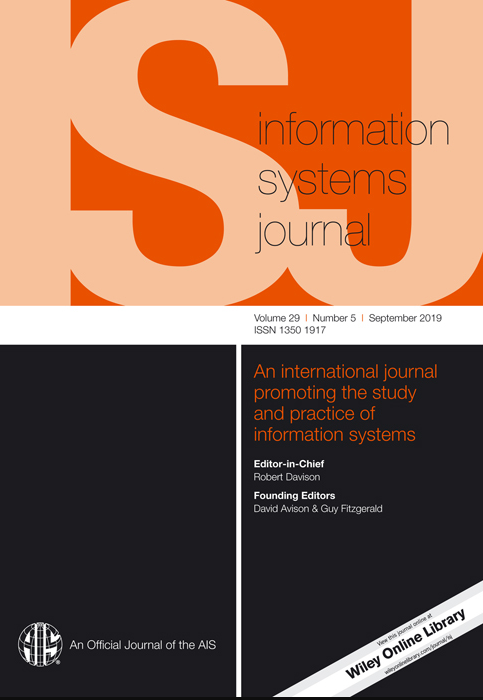
ISJ - volume 28 - 2018 论文列表 |
| 点击这里查看 Information Systems Journal 的JCR分区、影响因子等信息 |
Volume 28, Number 6, November 2018
Ferdinand Thies Michael Wessel Alexander Benlian
Sponsor's cocreation and psychological ownership in reward-based crowdfunding.Haichao Zheng Bo Xu Min Zhang Tao Wang
How infrastructures anchor open entrepreneurship: The case of Bitcoin and stigma.Claire Ingram Bogusz Marcel Morisse
From a marketplace of electronics to a digital entrepreneurial ecosystem (DEE): The emergence of a meta-organization in Zhongguancun, China.Wenyu Derek Du Shan L. Pan Ning Zhou Tao Hua Ouyang
Digital transformation by SME entrepreneurs: A capability perspective.Liang Li Fang Su Wei Zhang Ji-Ye Mao
Digital entrepreneurship.Kathy Ning Shen Valerie Lindsay Yunjie (Calvin) Xu
The advancement and persistence of women in the information technology profession: An extension of Ahuja's gendered theory of IT career stages.Deborah J. Armstrong Cynthia K. Riemenschneider Laurie Giddens
Improving the retention of women in the IT workforce: An investigation of gender diversity interventions in the USA. Exclusions in social inclusion projects: Struggles in involving children in digital technology development.Netta Iivari Marianne Kinnula Tonja Molin-Juustila Leena Kuure
Mobile health technology adoption across generations: Narrowing the digital divide. ISJ Editorial.Volume 28, Number 5, September 2018
David Jingjun Xu Izak Benbasat Ronald T. Cenfetelli
IT-mediated social interactions and knowledge sharing: Role of competence-based trust and background heterogeneity.Israr Qureshi Yulin Fang Nicole Haggerty Deborah R. Compeau Xiaojie Zhang
Shaping a buyer's software selection process through tendering legislation.Albert Boonstra Marjolein van Offenbeek
Using structural technology acceptance models to segment intended users of a new technology: Propositions and an empirical illustration. Innovation among different classes of software development organizations.James E. Gaskin Nicholas Berente Kalle Lyytinen Gregory M. Rose
Violations of health information privacy: The role of attributions and anticipated regret in shaping whistle-blowing intentions.Mark Keil Eun Hee Park Balasubramaniam Ramesh
Trajectory of Affordances: Insights from a case of telemedicine in Nepal. Achieving IT-based synergies through regulation-oriented and consensus-oriented IT governance capabilities. Promoting indigenous theory.Volume 28, Number 4, July 2018
Jacqueline Pike Patrick J. Bateman Brian S. Butler
Getting the control across: Control transmission in information systems offshoring projects. Contextualizing a professional social network for health care: Experiences from an action design research study. Employee dispositions to job and organization as antecedents and consequences of information systems use. Will cloud computing make the Information Technology (IT) department obsolete? Declarations of significance: Exploring the pragmatic nature of information models. Transactive memory systems and Web 2.0 in knowledge sharing: A conceptual model based on activity theory and critical realism. Shifting baselines in information systems research threaten our future relevance.Volume 28, Number 3, May 2018
M. S. Sandeep M. N. Ravishankar
Entrepreneurial impact sourcing: a conceptual framework of social and commercial institutional logics.Shaji Khan Mary C. Lacity Erran Carmel
Global sourcing and development: New drivers, models, and impacts.Brian Nicholson Sundeep Sahay Richard Heeks
Reconceptualizing object construction: the dynamics of Building Information Modelling in construction design. The pastoral crowd: Exploring self-hosted crowdfunding using activity theory and social capital. An activity theory study of data, knowledge, and power in the design of an international development NGO impact evaluation. Multiple social media in the workplace: Contradictions and congruencies. Activity theory in Information Systems Research.Volume 28, Number 2, March 2018
Thomas Jensen Ravi Vatrapu Niels Bjørn-Andersen
Unravelling causal and temporal influences underpinning monitoring systems success: A typological approach.Federico Iannacci Tony Cornford
To sell or not to sell: Exploring sellers' trust and risk of chargeback fraud in cross-border electronic commerce.Yue Guo Yongchuan Bao Stuart J. Barnes Khuong Le-Nguyen
Using ICT for social good: Cultural identity restoration through emancipatory pedagogy. Email adaptation for conflict handling: A case study of cross-border inter-organisational partnership in East Asia.Joyce Yi-Hui Lee Niki Panteli Anne Marie Bülow Carol Hsu
IT professionals' person-organization fit with IT training and development priorities.Stephen C. Wingreen J. Ellis Blanton
Examining employee computer abuse intentions: insights from justice, deterrence and neutralization perspectives. The ethics of extended revisions.Volume 28, Number 1, January 2018
Nik Rushdi Hassan Lars Mathiassen
Metaphors in managerial and employee sensemaking in an information systems project.Riitta Hekkala Mari-Klara Stein Matti Rossi
Diffusion of knowledge in social media networks: effects of reputation mechanisms and distribution of knowledge roles.Taha Havakhor Amr A. Soror Rajiv Sabherwal
Rethinking the concept of the IS organization. Digitally enabled affordances for community-driven environmental movement in rural Malaysia.Yenni Tim Shan L. Pan Shamshul Bahri Ali Fauzi Ahmad Khan
My choice, your problem? Mandating IT use in large organisational networks.Andrea Carugati Walter Fernandez Lapo Mola Cecilia Rossignoli
Editorial: Researchers and the stakeholder's perspective.
